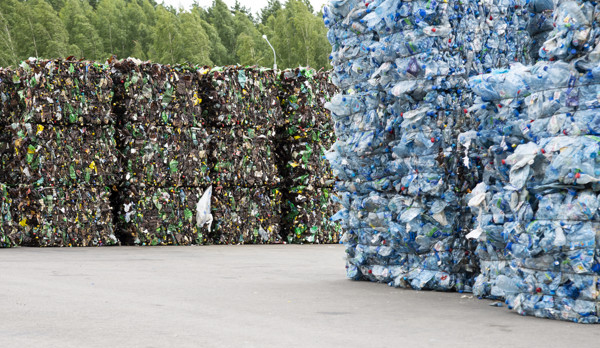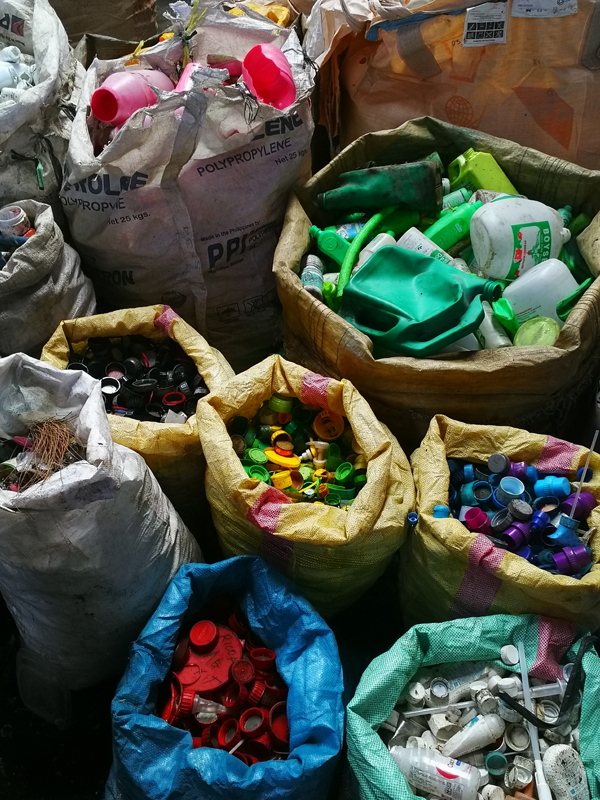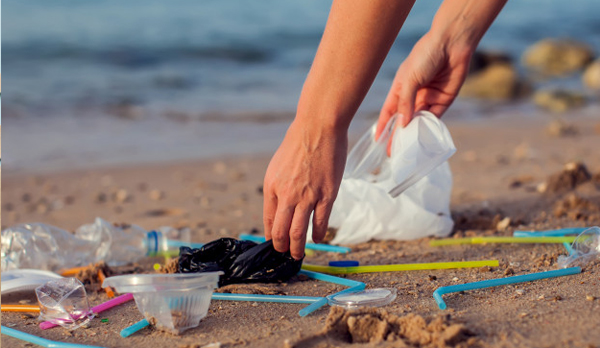The fight against plastic pollution in the Philippines continues! WWF is advocating for the Extended Producer Responsibility (EPR) Scheme to diminish plastic packaging waste.

The Situation of Plastic Pollution in the Philippines
Plastic pollution has reached enormous proportions worldwide. The use of plastic is so extensive that it has caused serious consequences to marine life and the wellbeing of society.
- Related: Basura = Baha sa Bacolod
This is equivalent to 50 kg of plastics for every coastline meter worldwide.
Based on a 2015 modelling study, the Philippines is one of the 10 top countries contributing to plastic pollution. Our country has been continuously challenged with increasing waste generation and the lack of sound waste management system.
In a recent study, it has been estimated that about 11 million tons of plastic enter the ocean every year. If plastic use continues, this number can triple by 2040.
This calls for a comprehensive approach among policy makers, corporations, cities, and consumers to ensure that plastics do not reach nature.
Extended Producer Responsibility (EPR) Scheme
Building on its No Plastics in Nature initiative, the World Wide Fund for Nature (WWF) Philippines released a report. It’s entitled “Extended Producer Responsibility (EPR) Scheme Assessment for Plastic Packaging Waste in the Philippines”.
This report was undertaken with cyclos GmbH and AMH Philippines Inc. It highlights EPR as a critical and effective policy to reduce plastic waste.
It is holding manufacturers accountable for the end-of-life impacts of their plastic products and packaging.

As a policy instrument, EPR encourages the adoption of holistic eco-design packaging among the business sector. The proposed EPR scheme is based on the findings of the first Material Flow Analysis of plastic packaging waste in the Philippines.
Plastic Use of Filipinos
The report shows that Filipinos consume a yearly average of 20kg of plastics, from which 15.43kg/year becomes waste.
Insufficient recycling capacities for high value recyclables (i.e. PET, PP, HDPE) and the high volume of low value plastics affect the country’s low plastic recycling rate. Right now, it is only 9% and a big chunk of the reason is because of those sachets.
Furthermore, the report estimates that the Philippines leaks about 35% of plastic wastes into the environment.
What Can the EPR Do?
These waste reduction and management conditions shaped the proposed customized EPR scheme in the Philippines.
It proposes a mandatory EPR scheme for all product packaging with a three-year transition phase. This is going to oblige businesses to redesign their product packaging and eliminate unnecessary plastics.
The implementation of the scheme for building high-quality recycling capacity should be assumed by a non-profit Producer Responsibility Organization (PRO). It should act as the system operator, complying with strict monitoring and control systems carried out by the government.
WWF’s Conclusion
The WWF believes that a mandatory EPR system is a way for businesses to eliminate unnecessary plastics. This will pave the way for a eco-design packaging to emerge and thus reduce plastic pollution in the Philippines.
Companies “will be more engaged in strengthening waste management by being responsible for the end of life impacts of plastic packaging. It is a driving mechanism for businesses to transform their models and push for circular solutions.” This was reported by Czarina Constantino, WWF-Philippines’ National Lead for the No Plastics In Nature Initiative. She is also the Project Manager for Plastic Smart Cities.

She says that these are integral to reduce plastic generation and ultimately to eliminating leakage of plastic in nature. “Adopting the EPR scheme in the Philippines is a great driver for us to stop plastic pollution,” she adds.
How the EPR Can Work
A key first step is a clear, effective, and unambiguous legal framework towards EPR.
Policymakers should take a decisive step to put this globally recognized waste reduction and management scheme in place. A legal framework for EPR should outline clear objectives, responsibilities, and enforcement mechanisms. Moreover, there should be a timeline for implementation and targets.

The effectiveness of the EPR system relies on the active role of government to regulate and supervise the system.
In the ASEAN Framework of Action on Marine Debris, they enjoin member states to develop and implement EPR policies. As the Philippines is part of this, we should also do our part.
No Plastic in Nature Initiative
The study is part of the No Plastic in Nature Initiative. It is WWF’s global initiative to stop the flow of plastics entering nature by 2030,
They intend to do this through the following steps:
- elimination of unnecessary plastics
- doubling reuse
- recycling and recovery
- ensuring remaining plastic is sourced responsibly.
Through this initiative, WWF-Philippines has been working with cities on plastic leakage. They have also been in contact with policy makers to advocate for a global treaty on plastic pollution.

As for businesses, WWF-Philippines advocates a transition to circular business models. Finally, the general public has to campaign and more importantly, act.
“Addressing plastic pollution requires both upstream (production/pre-consumption) and downstream measures. (This is for consumption and post-consumption). ” This was said by Joel Palma, WWF-Philippines’ Executive Director.
Mr. Palma added that we should work on the entirety of the plastic life cycle. Furthermore, everyone should ensure that materials are used as long as possible in our society.
This is the best way to reduce plastic pollution in the Philippines.
What Nestlé Philippines is Doing
Nestlé Philippines is one of the leading producers of fast-moving consumer goods (FMCG) in the country. They are encouraging fellow stakeholders to do their part for nature by supporting the localized EPR scheme.
“At Nestlé, we believe that tackling plastic waste cannot be successfully achieved by a single or linear solution. It requires the attention and action of different stakeholders. We must look into different options both upstream and downstream. Moreover, we should take a holistic approach.” This was disclosed by Arlene Tan-Bantoto, SVP | Head of Corporate Affairs and Communications, Nestlé Philippines.

Nestlé Philippines supports the creation of a localized EPR scheme.
The company believes that this can help increase collection and recycling rates. But Ms. Bantoto says that they cannot achieve this alone. Everyone “must work together, to achieve a waste-free future.”
- Related: Bacolod Needs More Plants and Trees
Other Stories About the Environment
Meanwhile, here are other stories about the environment that you might want to read.
Take part to #ChangeTheEnding for our planet. Help work towards a vision of no plastics in nature.
- A few months before the lockdown for Covid-19, there was a move to cut down the trees at Capitol Shopping Center. I am so thankful it didn’t push through. Read: I Speak for the Trees – A Covid-19 Quarantine Story
- Bacolod City is becoming green again! Read: Kultivar de Bacolod: Online Hub for Plantitos and Plantitas
You may also like
Negros Power Joins 1st Renewable Energy Week in Negros Occidental
Sharp Philippines Eco Vision 2050 | Plant A Tree Environmental Campaign
SecuRE Negros: Ensuring Power Security with Renewable Energy
Mang Inasal Stores in Zamboanga Start Shift to Solar Panels
2GO Earth and Everyone: Sustainability in Energy, Environment, and Empowerment

Napakalaking problem nga ng Pilipinas ang Plastic Wastes..Mabuti may ganyang Project ang ibang Samahan To reduce the uses of plastic..Kaso di talaga maiwasan Na may matitigas ang mukha na gumagamit padin ng Plastic😔😔..
We just need this ,educating pinoys how to maintain it ,we can be far behind
This is a great project! We really need this to fight pollution to our country.